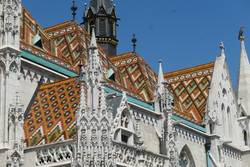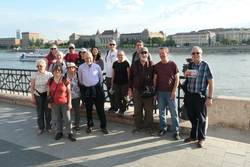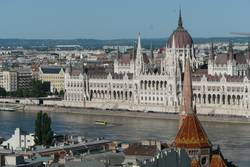In May the club sojourned a week in Budapest and I know that I can say that without exception all participants had an absolutely wonderful time. A lot of planning and organising was devoted to making this such a splendid and memorable week and to the organisers many thanks are due, also to those who cooked and shopped. All club holidays over the years have been very memorable and noteworthy. But this week in Budapest was a special week in allowing everyone to explore a city with so much to offer and to undertake so many varied activities. We have all returned home with a host of memories, swollen picture drives on our phones, and a feeling that we visited a superb city that provides so much for the serious traveller and guest.
I can remember fifty years ago in my school history lessons, a map of Europe of July 1914. I was fascinated by that huge space in this map that occupied much of central and eastern Europe, labelled enigmatically Dual-Monarchy. This was the empire of the Habsburgs, custodians of the Holy Roman Empire with its origins dating back to the reign of Charlemagne himself. Once a minor Swiss ducal family, by the late Middle Ages the Habsburgs had become Holy Roman Emperors and rulers of Austria before being offered the crown of Hungary as well by Magyar nobles. Ultimately the Austro-Hungarian empire the Habsburgs created was a multi-ethinic, multi-linguistic, disparate and fissiparous empire united by the Habsburgs being sovereigns and regnal dukes of the lands it was composed of.
 The history of the region and the Habsburgs permeates every facet of Budapest. It was particularly touching to see the memorials in the churches around the city to the Hungarians who fought so hard to defend and preserve the Empire in the battles against Piedmont in the Quadrilateral, in the fighting in the Balkans and in the ghastly strife of the First World War. Hungary from 1868 was an equal partner in the Empire and the Austrians and Hungarians gave an example to other countries how cooperation could work.
The history of the region and the Habsburgs permeates every facet of Budapest. It was particularly touching to see the memorials in the churches around the city to the Hungarians who fought so hard to defend and preserve the Empire in the battles against Piedmont in the Quadrilateral, in the fighting in the Balkans and in the ghastly strife of the First World War. Hungary from 1868 was an equal partner in the Empire and the Austrians and Hungarians gave an example to other countries how cooperation could work.
The First World War ripped apart this structure, which was the work of centuries to build. At the time of death in 1914 Franz Ferdinand was working on a strategy to make the Croats and Slovenes similar partners in the Empire alongside Austria and Hungary (the Czechs and Polish Galicians already had devolved powers). Without the First World War perhaps the Empire could have become something like a forerunner of the EU.
 Whilst we were there, we sampled the delights of the area. There was a trip to Lake Balaton and a trip over the border to Bratislava in neighbouring Slovakia. In Budapest itself there was a particularly memorable visit to the Great Synagogue in the Jewish quarter. It is a magnificent building, but the experience was made sombre by the testimonies in the Synagogue museum of the terrible sufferings inflicted here in the Second World War.
Whilst we were there, we sampled the delights of the area. There was a trip to Lake Balaton and a trip over the border to Bratislava in neighbouring Slovakia. In Budapest itself there was a particularly memorable visit to the Great Synagogue in the Jewish quarter. It is a magnificent building, but the experience was made sombre by the testimonies in the Synagogue museum of the terrible sufferings inflicted here in the Second World War.
Our final visit was to the archaeological park at Aquincum on the outskirts of Budapest. As well as the usual Roman street lines and stones, our visit coincided with the Roman festival of Floralia. This included costumed reenactments and talks (in Hungarian). There was a particularly intriguing demonstration of the working of a Roman water organ and an aulos (a double flute).
A great holiday immensely interesting and enjoyable. Thanks again to the organisers and to all those who made it so special and memorable.
John M
Four Go Cycling in Essex
Last Sunday, a select group of CYHA went for the first group bike ride of the year. Dave, Ali, Lily and Jim met at Writtle duck pond and cycled a pleasant 24 mile loop around the rolling countryside of the Easters, a Roding, and Willingale. The weather was warm and sunny, and highlights included tea, cakes and classic cars in High Easter, sandwiches sitting between the twin churches of Willingale, and finishing with afternoon tea at the Tiptree Jam tearoom at Writtle college. An enjoyable day was had by all, and the distance was about right for legs and behinds unaccustomed to cycling.
Jim
